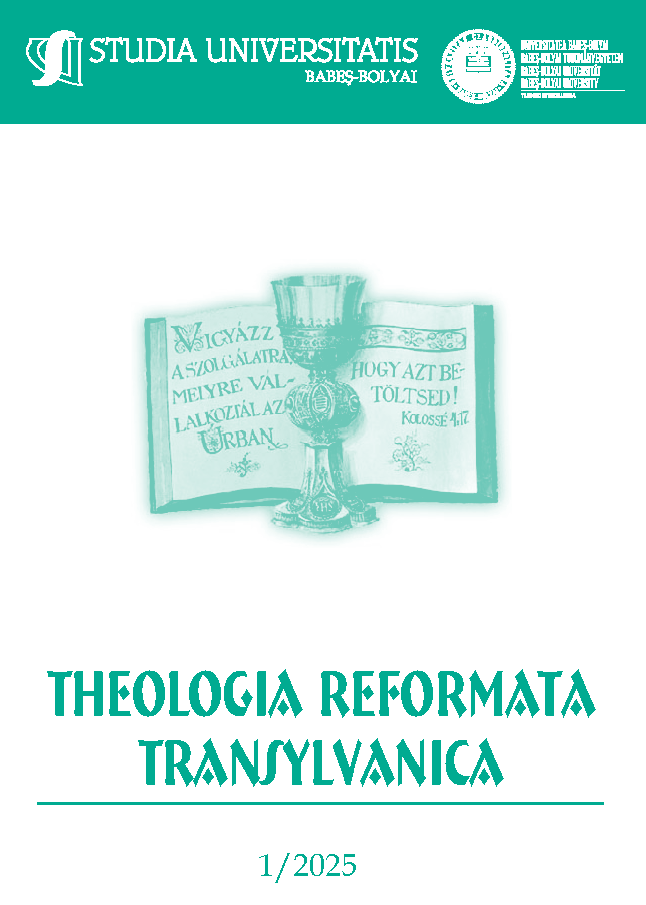A kapcsolatiság mint a teológiai módszertan lehetősége
DOI:
https://doi.org/10.24193/subbtref.70.1.04Keywords:
relational theology, globalization, postmodernism, existentialism, theological methodAbstract
Relationality as a Theological Method. Relationality as a theological method examines the methodological framework that unites globalization, multiculturalism, postmodern thought, and contemporary science. The relational perspective is not only an increasingly recognized approach to understanding reality but also offers a new perspective in theology. It appears particularly significant in existentialist philosophy and theology, where it provides a fundamental framework for exploring the dynamic relationships between humanity, the world, and God. Drawing on the methodological approaches of Ebeling and Tillich, as well as Kenan Osborne’s relational method, this study seeks to connect contemporary challenges with traditional religious perspectives. Through the concept and methodology of relationality, new layers of meaning emerge. The aim is to demonstrate how this methodological approach is understood and applied in addressing the relevance and applicability of theology today.
References
ABRAHAM, Susan (2007): Identity, Ethics, and Nonviolence in Postcolonial Theory: A Rahnerian Theological Assessment. Palgrave Macmillan US.
ASHWIN-SIEJKOWSKI, Piotr (2008): Clement of Alexandria: A Project of Christian Perfection. T&T Clark.
CELSOR, Scott A. (2010): Word and Faith in the Formation of Christian Existence: A Study in Gerhard Ebeling’s Rejection of the Joint Declaration, In: Dissertations (2009). (utolsó megtekintés dátuma: 2024. december 8.). Elérhető itt: http://epublications.marquette.edu/dissertations_mu/41.
DEPELTEAU, François – POWELL, Christopher (szerk.) (2013): Relational Sociology: Ontological and Theoretical Issues. New York, Palgrave Macmillan.
DONATI, Pierpaolo – MALO, Antonio – MASPERO, Giulio (szerk.) (2019): Social Science, Philosophy and Theology in Dialogue: A Relational Perspective. Routledge, London.
EBELING, Gerhard (1968): Word of God and Church Doctrine, In: The Word of God and Tradition. Ford. S. H. Hooke. London, Wm. Collins Sons and Co. – Philadelphia, Fortress Press.
(1973): Introduction to a Theological Theory of Language. Ford. R. A. Wilson. London, William Collins Sons and Co.
EGAN, Harvey (1978): Christian Apophatic and Kataphatic Mysticisms, In: Theological Studies. 39. 3. 399–426.
GUTTING, Gary (2005): Foucault: A Very Short Introduction. Oxford University Press, Oxford.
LUHMANN, Niklas (1995): Social Systems. Ford. John Bednarz, Jr. és Dirk Baecker. Stanford, CA: Stanford University Press.
MANTOVANI, Mauro (2013): Beauty and Conservation: A Metaphysical, Pedagogical and Ecclesiastical Perspective, In: Conservation Science in Cultural Heritage. 13. 1. 285–299. https://doi.org/10.6092/issn.1973-9494/4189.
MANTOVANI, Mauro – PERILLO, G. (szerk.) (2012): Momenti del Logos. Róma, Edizioni Nuova Cultura.
MASPERO, Giulio (2019): Trinitarian Ontology and Interdisciplinary Research, In: Pierpaolo, Donati – Malo, Antonio – Maspero, Giulio (szerk.): Social Science, Philosophy and Theology in Dialogue: A relational Perspective. London, Routledge. 74–95.
MASPERO, Giulio – WOZNIAK, Robert J. (szerk.) (2012): Rethinking Trinitarian Theology: Disputed Questions and Contemporary Issues in Trinitarian Theology. London – New York: T&T Clark.
OSBORNE, Kenan (2009): A Theology of the Church for the Third Millennium: A Franciscan Approach. (Studies in Systematic Theology). Brill, Leiden.
OSBORNE, Kenan B. O.F.M. (1969): New Being: A Study on the Relationship between Conditioned and Unconditioned Being according to Paul Tillich. Springer Netherlands.
PÁSZTORI-KUPÁN, István (2010): Követvén a szent atyákat: Az óegyház dogmatörténete 381-ig. Kolozsvár, Napoca Star – Kolozsvári Protestáns Teológiai Intézet.
PLATÓN: Állam. VI. könyv. 509 D–511 C.
PRZYWARA, Erich (2014): Analogia Entis. Ford. John R. Betz, David Bentley Hart. William B. Eerdmans.
RUOKANEN, Miikka (1982): Hermeneutics as an Ecumenical Method in the Theology of Gerhard Ebeling. Helsinki, Luther Agricola Society B13.
SHEEHAN, Thomas (1987): Karl Rahner: The Philosophical Foundations. Preface by Karl Rahner, SJ. Ohio (OH), University Press.
SPIVAK, Gayatri C. (1999): A Critique of Postcolonial Reason: Toward a History of the Vanishing Present. Cambridge (MA), Harvard University Press.
TILLICH, Paul (1951): Systematic Theology. Vol. 1. Chicago, The University of Chicago Press.
TONNER, Philip (2019): The Univocity of Being. Continuum.
WILLIAMS, Arthur – WALSH, James J. – HYMAN, Arthur (2010): Philosophy in the Middle Ages: The Christian, Islamic, and Jewish Traditions. Hackett Publishing Company, Inc.
YOUNG, Frances M. (1993): The Making of the Creeds. London, SCM Press.
Downloads
Published
How to Cite
Issue
Section
License
Copyright (c) 2025 Studia Universitatis Babeș-Bolyai Theologia Reformata Transylvanica

This work is licensed under a Creative Commons Attribution-NonCommercial-NoDerivatives 4.0 International License.



